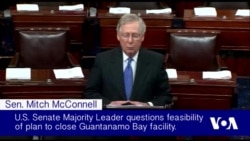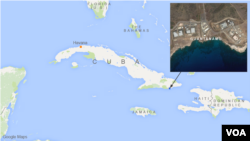U.S. President Barack Obama outlined his administration's plan for closing the military detention center at Guantanamo Bay, Cuba, saying the facility "does not advance our national security, it undermines it."
"If, as a nation, we don't deal with this now, when will we deal with it?" Obama asked at the White House, after the U.S. Defense Department delivered the plan Tuesday to Congress. He appealed to Congress to be "on the right side of history" and asked that the nation act on the "lessons" learned over the past 15 years.
Republicans already have criticized the Pentagon's proposal.
"Congress has left no room for confusion. It is against the law—and it will stay against the law—to transfer terrorist detainees to American soil," Speaker of the House Paul Ryan said. "We will not jeopardize our national security over a campaign promise."
“We are at war, yet incredibly the president is more focused on relocating and releasing enemy combatants than on detaining new ones, House Homeland Security Chairman Michael McCaul added.
WATCH: President Obama's plan faces an uphill battle
However, a senior administration official said closing the prison is a national security priority, adding that the facility has “inspired” jihadists and served as a recruiting tool for terrorists.
The President stressed the importance of closing the facility when he took office in 2009, but with less than a year left in his presidency, some 91 detainees remain. Obama said that when he took office there had been bipartisan support for closing the prison, but that over time lawmakers had become "worried about the politics" of it.
WATCH: Video of Sen. Mitch McConnell reacting to plan
“It’s purely politically driven,” Gary Solis, a law of war professor at Georgetown University, told VOA. “There are individuals who are so opposed to the Obama Administration, and I believe Obama personally, that they are simply unwilling to participate in any activity that might further his goals.”
The Pentagon plan to close the facility includes discussion of 13 potential sites within the United States where the military could transfer a group of about 30 to 60 detainees. However, it does not recommend which U.S. site should be chosen. Potential sites include federal prisons in Kansas, Colorado and South Carolina, as well as military facilities.
US Plan to Close Guantanamo Bay Detention Center
U.S. Plan to Close Guantanamo Bay Detention Center
The Obama administration's efforts to close the Guantanamo Bay detention facility include:
- Identifying transfer opportunities for eligible detainees.
- Reviewing by fall 2016 the threat posed by detainees currently not eligible for transfer and those who are not facing military commission charges.
- Continuing military commission prosecutions for those currently charged.
Even with these efforts, the administration expects that there will be a limited number of detainees who are deemed to dangerous to release. The administration said it will work with Congress to relocate those detainees who are not eligible for transfer or who are not candidates for prosecution to a secure detention facility in the continental United States while continuing to find other appropriate and lawful non-U.S. dispositions.
A senior administration official said moving the prisoners from Cuba to the U.S. will save the Pentagon between $65 million and $85 million per year, and would offset the initial cost needed to move the prisoners within three-five years.
“As the detainee population goes down, the per-person/per-man cost goes up dramatically, of course. So, it’s well over a million dollars a year per person at Guantanamo now,” Solis told VOA.
Obama added Tuesday that the overall savings from the move would amount to $1.7 billion over the next 20 years.
The proposal does not include an exact cost or location for the replacement facility, which Republicans, including Speaker of the House Ryan, used to slam the plan.
Senior administration officials, however, pointed to the restrictions made by Congress as to why they were unable to provide more specific costs and locations.
Of the 91 detainees, a U.S. official told VOA that 35 have been approved for transfer, and they are expected to be transferred to other countries by this summer. Another 10 are somewhere within the military commissions process, the official said.
Current U.S. law bans the transfer of Guantanamo Bay detainees to locations within the United States. Some say those transfers could bring security concerns.
The White House has left open the possibility Obama could use an executive order to close Guantanamo.
Detention center
The Guantanamo facility opened in 2002 under the administration of former President George W. Bush following the September 11 terror attacks in New York and Washington. Nearly 800 detainees have been held there at some point since then, many for long periods without being charged or put on trial.
Most of the detainees have been transferred back to their respective home countries or other nations willing to take them in.
Mary Alice Salinas contributed to this report from the White House.








